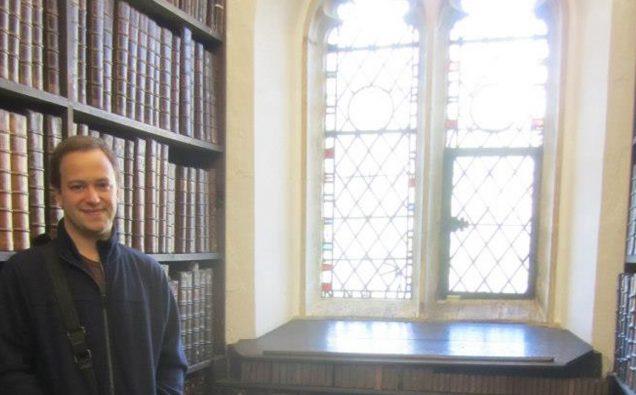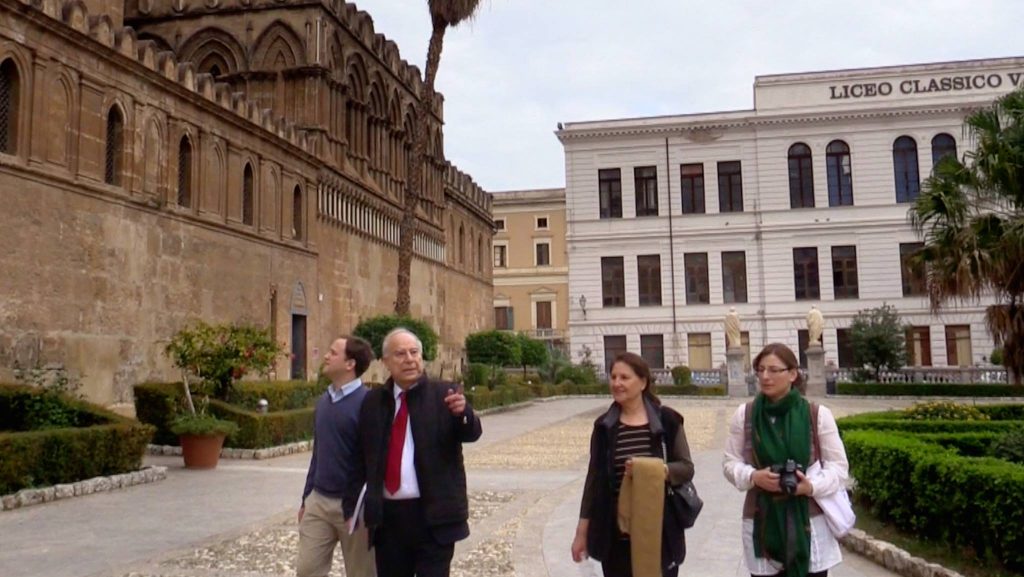
When I launched my new book Journey into Europe: Islam, Immigration, and Identity about Islam in Europe at SOAS in London earlier this summer, the renowned political theorist Lord Bhikhu Parekh chaired the session.
Lord Parekh was a patron of the project from the beginning and spoke of his delight at seeing it to completion, but what struck him the most he said was the book’s dedication. Invoking concepts from his Hindu tradition, he explained,
“He’s done something absolutely remarkable, which I haven’t seen before. The book is dedicated, amongst others, to one of his students… And that is a marvelous compliment from a guru to his chela. From a teacher to his student.”
Lord Parekh was referring to Frankie Martin, and he is someone worth introducing to our readers.
Frankie was my honors student as an undergraduate at American University in Washington, D.C. and first joined my class in 2003. The class was an introduction to Islam and the Muslim world called “The World of Islam” and he soon took several others such as “Dialogue or Clash of Cultures” in which we engaged with ideas such as the “Clash of Civilizations” and explored whether dialogue was an effective counter to this idea.
These ideas of dialogue and communication across barriers of religion, culture, and ethnicity and promoting understanding through knowledge, education, and scholarship deeply resonated with Frankie. Frankie had spent formative years in Nairobi, Kenya in middle and high school, where his father was posted with the US government working on the resettlement of refugees to the US. There Frankie developed an interest in the history and culture of the local people he met, and would go on to write his anthropology masters thesis at the University of Cambridge on Kenya’s Mau Mau rebellion against British colonial rule.
Committed to improving relations between different peoples and particularly Muslims after 9/11,Frankie joined me as a researcher while still an undergrad and has been working closely with me ever since. He was central to my quartet of projects on the relationship between the West and the Muslim world after 9/11that I conducted within an anthropological frame, which is unique in the social sciences. As a part of these large-scale projects, Frankie travelled with me, conducted copious research, contributed notes to the studies, conducted numerous interviews, spoke at public forums, wrote many articles, and appeared in the media. Throughout he has shown both a passion for and a commitment to the work we were doing.
The first project was my book Journey into Islam: The Crisis of Globalization (2007) in which I examined the state of the Muslim world after 9/11 and how Muslims around the world felt about America and the West. Thus it made a huge difference to have young Americans traveling with me, and Frankie accompanied me across the Muslim world to places like the Middle East and Pakistan to conduct field research. He was fascinated by these travels and the opportunity to meet Muslims and spoke of how hospitable the people were who he met. Frankie accompanied me during fieldwork to orthodox seminaries like Deoband in India and he even received a beautiful carpet as a gift from Chaudhry Shujaat Hussain, the former Pakistani prime minister, when we called on him and Chaudhry Pervaiz Elahi, the Chief Minister of Punjab and presently Speaker in the Punjab Assembly, for lunch at the Chief Minister’s residence in Lahore. Frankie always spoke with great warmth of Pakistan and its hospitable people.
Frankie then accompanied me as lead interviewer on a journey through his own country, the United States, for the book and film project Journey into America: The Challenge of Islam (2010).We traveled to 75 US cities and 100 mosques across the length and breadth of the country over the course of a year studying the Muslim community and its relationship to American identity. We interviewed hundreds of people from every conceivable community in the US about what they thought it meant to be American and how they saw Islam and Muslims.
I then embarked on an extensive study of tribal societies that have become caught up in the “War on Terror” in my book The Thistle and the Drone: How America’s War on Terror Became a Global War on Tribal Islam (2013). Frankie served as senior researcher on that project which examined 40 case studies of tribal societies from Morocco to Indonesia. We found that much of the high levels of violence we are seeing in the Muslim world stems from a breakdown in relations between tribal societies and central governments. We hoped to bring light to the problem in the hope that it could be ameliorated.
Frankie went on to serve as my senior researcher on our current book and film project about Islam in Europe and the place of Islam in European civilization and history, Journey into Europe: Islam, Immigration, and Empire(2018). Like our project in the United States, we traveled across the continent interviewing hundreds of people in countries ranging from the UK and Spain to Bosnia and Germany. Frankie additionally served as the associate producer and assistant editor of the documentary film, Journey into Europe, that we shot as we traveled.
I can capture the impact that Frankie has had in an event he accompanied me to in New York around the time of our first study Journey into Islam. I was invited to address the Council on Foreign Relations on the subject of Islam and the West with Karen Armstrong. With Armstrong in the green room, a friend of mine, a Pakistani ambassador who was working at the UN, went down the line shaking the hands of those assembled as I introduced them. When he met Frankie, he shook his hand, and then moved on to the next person. But then he stopped, turned around, and looked back at Frankie and said, “You’re not the Frankie Martin?”
Let me conclude with my book dedication to Frankie from Journey into Europe:
“Frankie joined me as a student in my class in 2003 and soon became central to my tetralogy of studies. I can only conjecture with amusement what the students thought of our peregrinations around the campus as, deep in discussion, I expounded on the topic du jour and Frankie, cell phone in hand, typed notes to discuss, debate, and research, a practice we continued even in the gym whether I was on the treadmill or lifting weights. I had the consolation of knowing that we were following the classic pedagogical model of peripatetic ponderings provided to us by none other than the Greeks — Socrates, Plato, and Aristotle. I look forward to the fashion catching on in the academy. With his affection, loyalty, respect, humor, integrity, and above all, passion for the pursuit of knowledge displayed over the years, Frankie became like a favorite son. No father could be prouder of his offspring than I am of Frankie. I owe him far more than he will ever know. Here I simply express my gratitude to him for being who he is and having faith in me and my work over these years.”















